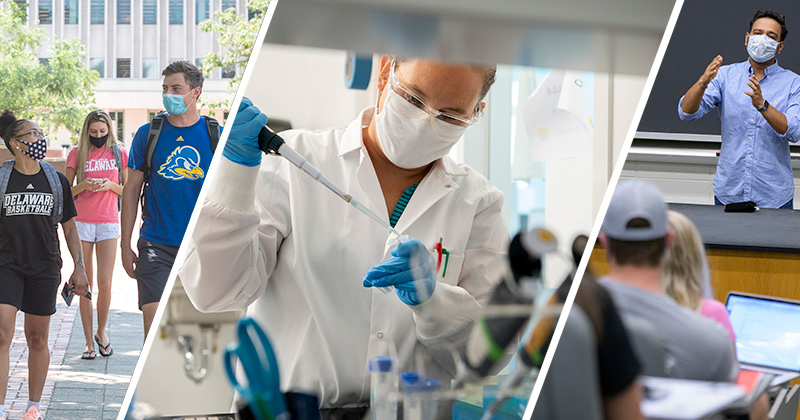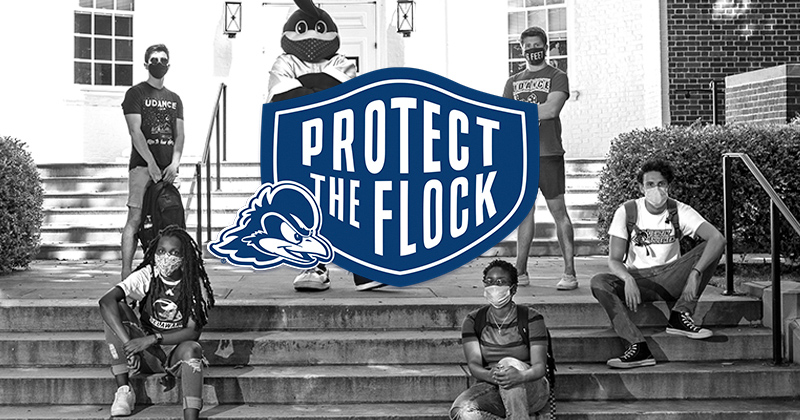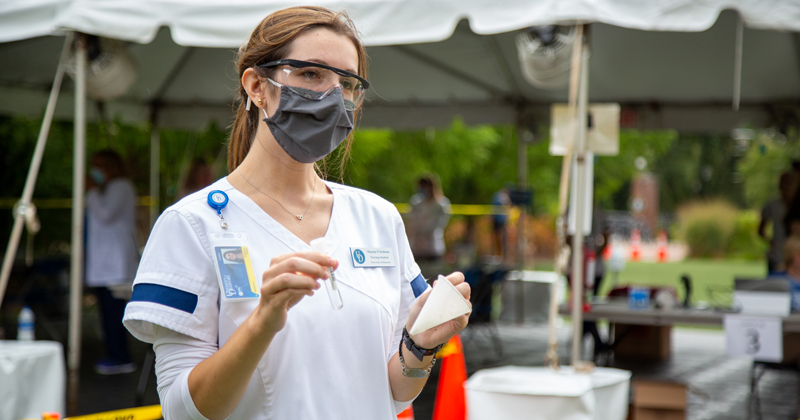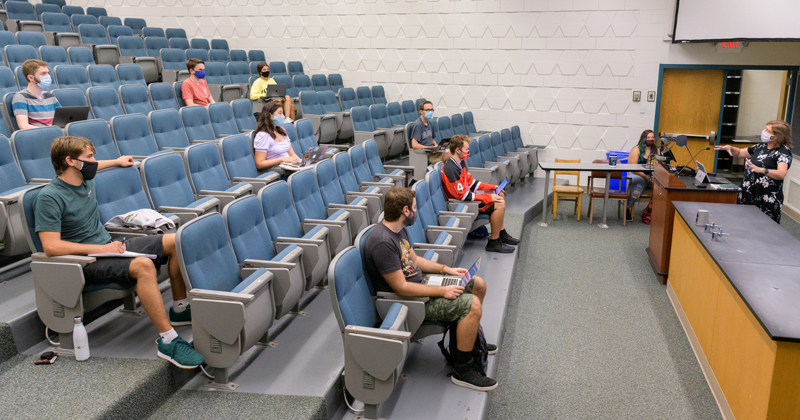

UD thrives in the fall semester despite pandemic: youtube.com/watch?v=4H16sqPN4IM
Resilience and connection
Photos by Kathy F. Atkinson, Evan Krape and Ashley Barnas | Video by Ally Quinn | Illustration by Christian Derr November 12, 2020
Despite the global pandemic, Blue Hens continue to persevere
The coronavirus (COVID-19) pandemic has turned the world inside out — or, more accurately given the need for lockdowns, outside in. So a traditional college experience with games of hacky sack on the grass and late-night cram sessions with friends? That went out the window about the same time people began sanitizing their Dorito bags. But at the University of Delaware, recent semesters — although atypical — have proven successful.
While a majority of students transitioned to a virtual learning format, the spirit of engagement, mentorship and service that mark the Blue Hen experience transcended Zoom. On campus and off, the UD community came together to make the most of an unprecedented moment, channeling this global struggle into research, art, innovation and academic rigor. Now, as the University prepares for a more robust in-person experience in the spring, this community is building upon momentum gained during a period of resilience and, oddly enough, connection.
“In the face of extraordinary public health and socio-economic challenges, we need to rise above, seizing new opportunities to be both creative and productive as we reinvent tomorrow with renewed Blue Hen spirit,” UD President Dennis Assanis wrote in a letter to the campus community on Sept. 1, the first day of fall classes. “Not surprisingly, the University of Delaware community has stepped up to that challenge.”

So how, exactly, did this “stepping up” happen? And how will our Blue Hen community continue to persevere, despite all the challenges of 2020?
Prioritizing health
From the outset, protecting health and safety served as the guiding principle for campus leadership. UD administrators worked alongside public health officials and faculty experts to determine the best path forward.
For the fall, this plan included limiting face-to-face instruction, designating specific quarantine spaces and establishing social distancing protocols in all campus buildings. Daily health screenings continue to be mandatory for anyone utilizing UD facilities, while a robust on-campus program provides regular coronavirus testing of both symptomatic and asymptomatic individuals. For contact tracing, the University partnered with the Delaware Division of Public Health, and together launched the COVID Alert DE smartphone app, which notifies users who have come into close contact with positive cases.
Since the beginning, several communication initiatives have been activated to both inform and empower Blue Hens to act responsibly with community health and safety as a shared priority. In March, UD launched a coronavirus website with answers to frequently asked questions, and this page is continually updated. Volunteers from departments across campus staff a virtual email center seven days a week. Additionally, as part of its commitment to transparency, the University updates every weekday a dashboard with information on testing rates and confirmed positive cases in the community.

To strengthen this culture of health and caring, UD’s Office of Communications and Marketing collaborated with students, faculty and staff to conceive and produce the Protect the Flock campaign, which encourages responsible behavior and shared commitment to one another.
These efforts to promote wellbeing during a turbulent period have included mental health initiatives. The Center for Counseling and Student Development transitioned its existing services, including therapy and crisis support, to a virtual format. And the office has added resources specifically tailored for pandemic-related stress.
For Blue Hens facing unanticipated hardship in the midst of the pandemic, UD is meeting housing and financial security needs through a Student Crisis Fund, a community crowdsourcing effort. And, for those with academic technology needs, the University offers a Laptop Loaner Program.
Innovating teaching and learning
Meanwhile, faculty members are successfully maintaining (and, in multiple cases, improving) the academic experience at UD. With guidance from UD Information Technologies and the Center for Teaching and Assessment of Learning, professors efficiently transitioned nearly 6,500 classes to an online format.
“I have never been prouder of the University of Delaware,” Provost Robin Morgan said about the willingness and creativity with which instructors approached this task.
Take David Brinley, professor in the Department of Art and Design. Having realized that an online format more closely mimics the reality students will face when working with clients in a post-college setting, he said, he has leveraged the moment to ramp up lessons on the business side of the field: rates, contracts and “all the things that feel more theoretical in the classroom.” He also encouraged his students to channel their emotions about the virus into their work. One of them, senior Chiara Fiori, created a digital painting of a hospital worker that’s been incorporated into a United Nations stamp project.

In the Department of Music, trumpet instructor Mark Clodfelter has been teaching remotely with the help of digital audio workstations, or DAWS. This tool allows an undergraduate ensemble of musicians to continue performing together from homes across the northeast — they each record themselves before submitting their parts to Clodfelter, who then edits the submissions into a single performance the students are able to critique.
“I tried to imagine something that would not only be continued learning, but possibly be even more engaging and exciting,” Clodfelter told UDaily in June. “Something meaningful and new.”
Similarly, art conservation professors have adapted a typically hands-on curriculum to the restrictions of a pandemic — they equipped students with personalized kits of materials for creating textiles and preserving artifacts at home. Inspired by a hobby that continues gaining traction during quarantine — sorting through old stuff — these students also undertook a public outreach project. For a series of blogs entitled “Attics and basements and closets, oh my,” they researched and shared their advice on caring for family heirlooms, from old photographs to quilts and jewelry.
“I’m very grateful for how the faculty are adapting to ensure we still get the best experience possible,” Miriam-Helene Rudd, an Honors art conservation student, told UDaily in October.

Over the summer, more than 450 undergraduates completed research, mostly at home. At kitchen tables around the country, they analyzed data, conducted interviews, collaborated with experts and helped answer questions with real-world impacts. From mapping sea ice changes in Antarctica to analyzing the population dynamics of sand tiger sharks in North Carolina, students made tangible contributions across the globe.
“My advice to anyone is to never give up,” Drew Huffer, a junior civil engineering major, told UDaily in August. “Times will be tough and limits will be pushed, but keep on persevering because there is light at the end of the tunnel.”
From the beginning, these and all online learners have had the support of UD’s Office of Academic Enrichment, which transitioned all of its offerings — including tutoring — to a virtual format.
Facilitating connection
Because the college experience is about more than academics, providing engaging involvement opportunities for Blue Hens has been key — on campus and off.
The fall semester kicked off with 1743 Welcome Days, a slate of virtual programming for new students meant to foster a sense of belonging. The lineup included poetry slams, ice-breaker games and discussions with upperclassmen about everything from personal identity to financial health. As part of this programming, undergraduates attended Involvement Fair 2.0, which introduced participants to hundreds of opportunities for fun, service and personal development — no matter their quarantine location.
UD has also hosted gripping virtual lectures members of the campus community can enjoy from their own homes. In one such event, former presidential candidate Pete Buttigieg shared his vision for uniting a polarized country. And, for an audience of 1700, activist and esteemed race scholar Ibram X. Kendi discussed what it means to live as an anti-racist.

For Latinx and Hispanic Heritage Month, campus units coordinated a robust lineup of virtual speakers and activities. And the Division of Student Life’s wildly popular Friday night series known as Perkins Live has streamed the shows of comedians, mentalists and magicians throughout the fall. Bingo nights have drawn upwards of 500 remote participants.
In UD’s Morris Library, transitioning workshops, exhibitions and other events to a virtual format has resulted in greater access.
“We have seen an increase in attendance, because of course we are not limited by room size,” said Shelly McCoy, associate University librarian for communication and space planning.
The library itself has remained safely open to Blue Hens with the use of a reservation system that limits capacity. While the stacks aren’t available for perusing, students can request a title through a new pick-up service. For those off-campus, resources are available electronically through the Hathi Trust, a partnership of academic institutions offering millions of digitized materials.
While UD’s Carpenter Sports Building (Little Bob) recreation facility offered only virtual experiences at the onset of the pandemic — including online fitness classes — careful planning has allowed for a successful reopening. Gym equipment has been reorganized to allow for maximum social distancing, and a new reservation system keeps building capacity to 30%.
“The graciousness and understanding of the students has been really cool to see,” said Adam Jines, interim director of recreation services. “The feedback we’re getting is that they feel safe.”
Sharing expertise and resources
Providing reliable, factual information to the UD community and beyond has been important to UD faculty since the onset of the pandemic. If you have been a regular consumer of regional or national news in recent months, for example, it is likely you have come across the words of Jennifer Horney, founder of UD’s Epidemiology Program and go-to public scholar for a variety of media outlets, from National Geographic to CNN to Scientific American.
“I’m happy to take the time to do it because there is so much misinformation out there, particularly on social media,” Horney told UDaily in March. “If the interview just gets factual information in a few people’s hands — or inboxes — then it’s worth it.”
Meanwhile, the Center for Disabilities Studies is providing information and other pandemic-specific resources. Students with intellectual disabilities in the unit’s Career and Life Studies Certificate (CLSC) program, which offers career and daily skills training alongside undergraduate coursework, are now taking advantage of mock interviews conducted over Zoom with staff from across campus.
“We do our best to maintain a push-forward attitude,” Igbal Attaelmanan, program assistant for academic and career exploration, told UDaily in May. “Our students really took that to heart.”
Conducting research, always innovating
The Carnegie Foundation for the Advancement of Teaching classifies UD as a research university having very high research activity — a designation accorded fewer than 3% of U.S. colleges and universities. So it is no surprise that, when the pandemic struck, some of the brightest minds on campus (and in the nation) shifted their research focus to the coronavirus.
For some, this has meant digging into the impacts of the disease on society — and how to mitigate these impacts. Others have focused on the virus itself. Juan Perilla and Jodi Hadden-Perilla, both assistant professors in UD’s Department of Chemistry and Biochemistry, are using supercomputer simulations to analyze the molecular structure of the virus at the atomic level.
“If you understand how [the virus] works, you can understand how to make it stop working,” Hadden-Perilla said.
Such research efforts on campus have led to important innovations. Jenni Buckley and Whitney Sample, co-directors of UD’s Design Studio, conceived of a new, 3-D printable mask design. And Jason Gelghorn, assistant professor of biomedical engineering, has developed an affordable, scalable method for disinfecting protective equipment with ultraviolet light.
Looking ahead
In the spring of 2021, with the collaboration of faculty and students, UD will restore some of the rhythms of campus life.
With a ramping up of testing and other safety procedures, the University will increase residential capacity and opportunities for face-to-face instruction. More in-person involvement opportunities, including athletic competition, will also be made available.
“Clearly there are health and socio-economic challenges,” Assanis said in a recent town hall for students. “But there is also hope.”
Contact Us
Have a UDaily story idea?
Contact us at ocm@udel.edu
Members of the press
Contact us at 302-831-NEWS or visit the Media Relations website

